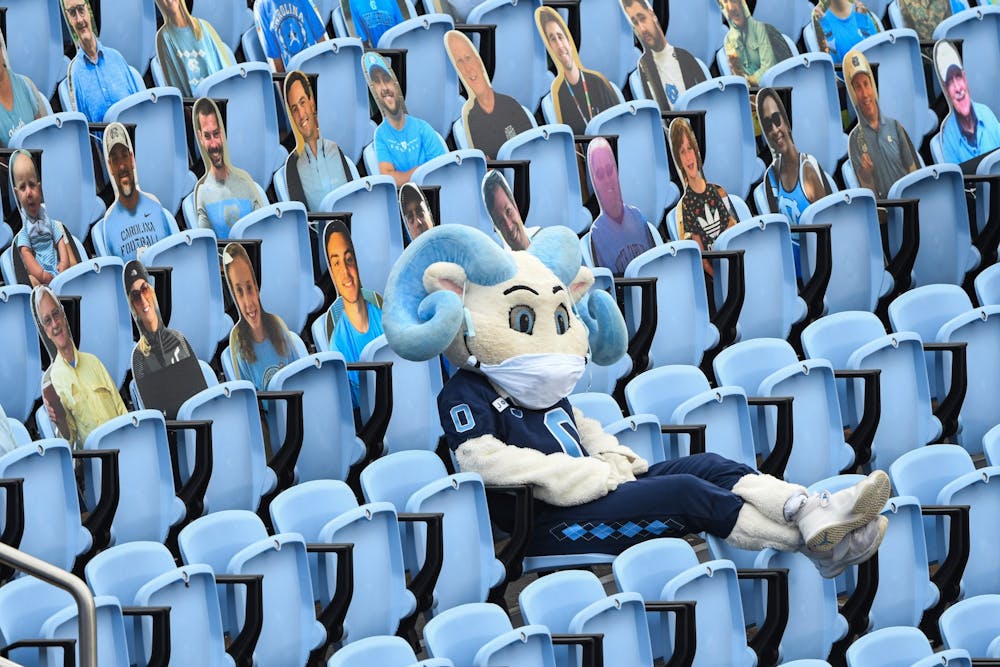The fact that these positive cases occurred before games had even begun was enough to make some athletes hesitant.
Three North Carolina women’s soccer stars left the team to pursue professional playing careers overseas in August.
Four football players, including redshirt senior defensive back D.J. Ford, opted out of the season by the middle of the month, as well.
“Personally, I just wasn’t comfortable,” Ford said. “I was one of the guys who was more paranoid, who was at home."
“I told myself I would give it a shot, went to workouts, then we had our first day in pads with the face visor and everything,” he continued. “Things were just very different. I felt like I was having trouble breathing, like I said, I was very paranoid about becoming infected. I just didn’t feel good about the season and potentially being exposed to people.”
Although Ford said his coaches and teammates were fully supportive of his decision, the opt outs at UNC, and other schools across the country, raised more questions about just how successful any attempt at a season would be.
Like clockwork, though, the football program returned to voluntary workouts after a temporary pause. And, like clockwork, more speed bumps popped up on the road to normalcy.
UNC Athletics announced on Aug. 19 that it was temporarily suspending all athletics activities for all sports teams due to the spread of COVID-19 on campus shortly after the fall semester began. No official numbers regarding positive cases in the athletics department were released.
It could’ve been the nail in the coffin. Plenty of people would’ve understood if the University decided it was for the best to take a few months off from athletics before reevaluating ahead of the winter.
But no — just a few days later, UNC announced that men’s and women’s basketball, cross country, field hockey, men’s and women’s soccer and volleyball would resume activities on Aug. 23, while football opted to return to practice on Aug. 24. Considering the CDC’s quarantine guidelines recommended 14 days of isolation after coming in contact with a person who has COVID-19, the University's fleeting pause raised questions about how serious things were.
Still, the athletics department marched on like a well-oiled machine, improvising and pulling solutions out of its magician’s hat whenever trouble arose.
The football team went ahead with its revamped 11-game schedule and when UNC-Charlotte called off the Tar Heels’ second game of the season due to several offensive linemen having to quarantine, North Carolina picked up the phones and set up a late-season replacement clash with Western Carolina for the end of the season.
To get the day's news and headlines in your inbox each morning, sign up for our email newsletters.
"Charlotte was not able to come because of COVID," Brown said on a Nov. 30 press conference. "So then we said, okay, we just won't play another one. And the ACC office told us that we needed to play another one because we had promised so many TV exposures."
Since then, the Tar Heels seem to have been rolling with the punches.
The football team hasn’t had any additional pauses attributed to coronavirus. The volleyball team postponed a pair of matches against Virginia for about three weeks before eventually facing the Cavaliers after reports that Virginia was dealing with COVID-19 issues.
The women’s soccer team canceled its match against Virginia around the same time and the field hockey team’s contest with Boston College in late October never happened after a BC player tested positive for the virus. If the football team finishes out the remainder of its schedule, these incidents and the UNC-Charlotte game would mark the only athletic events from the school’s updated schedules to be canceled this fall.
In some ways, it’s remarkable the University has been able to conduct as much of these seasons as it has.
Looking ahead to winter and spring sports, though, the men’s basketball team’s season barely got underway before its matchup with Elon, the fifth game of the year, was postponed due to COVID-19 issues within the opposing program.
"It's the world we live in," UNC men's basketball head coach Roy Williams said in a press conference before the start of the season. "I don't like it. I like normalcy. I like a routine. But that's not what we have right now. You can just do everything you can possibly do and still have a slip up. But the process, you need to do everything you can possibly do and be prepared to handle everything as well.”
With COVID-19 cases rising throughout the country, there’s still a cyclical nature to the peaks and valleys of sports right now, even months after UNC teams began returning to campus. Teams can be healthy and in good spirits one week before a positive test and subsequent contact tracing knocks out a chunk of the squad right before a game. Only time will tell how long North Carolina is able to continue riding the high of this trend of no recent cancellations.
Because, as Brown knows from experience, things can change in a split second.
“It just goes from nothing to fast,” Brown said this summer.
@McMastersJ
@dthsports | sports@dailytarheel.com




